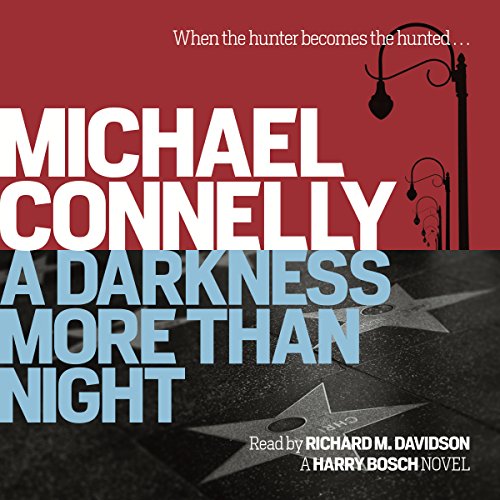A Darkness More Than Night
Authors: Michael ConnellyNarrator: Vincent Marzello
Duration: 12H 32M
My Rating: ⭐🌑🌑🌑🌑
Tags: detective - action - thriller
I forced myself through this book, just to get done with it, and I don’t want to go back. It tells ex-fbi profiler routines.
The investigations, court case that is in progress and final reveal is also very poor.
The worst book I’ve listened too so far. It took me too much effort just to finish it. I was keeping switching between books. Nothing that caught my interest - narration, plot, inside work description. Seems like completely different person wrote those. Too much water and Mondain description that i was not interested in.
Feels like a different person wrote this book.
Quotes:
So what’s it like, Terry? Being a father. … It’s like having a gun to your head all the time. Because I know if anything ever happens to her, anything, then my life is over.
He knew he was going to do it with or without her approval but he wanted it from her just the same. Their relationship was still so new that he seemed to always be seeking her approval. He had thought about this and wondered if it was something to do with his second chance. Somehow he felt as though if he could just win this one woman’s approval for his existence, then it would all be okay. His cardiologist had called it survivor’s guilt. He had lived because someone else had died and must now attain some sense of redemption for it.
McCaleb knew that she was carefully choosing her words and demeanor with the future in mind, a future that would include a trial for an accused killer in which the crime scene tape would be viewed by a jury. She had to appear professional and objective, completely emotionally removed from what she was encountering. Anything deviating from this could be cause for a defense attorney to seek removal of the tape from evidence.
Words from a killer were always significant and put a case on a higher plane. It most often meant that the killing was a statement, a message transmitted from killer to victim and then from the investigators to the world as well.
He didn’t tell her that he’d work the case for free, just to be back in the life for a few days. And he didn’t tell her that he couldn’t take any money from her anyway. If he made any “official” income he would lose his eligibility for the state medical assistance that paid for the fifty-four pills he swallowed every day. The pills were so expensive that if he had to pay for them himself he’d be bankrupt inside six months, unless he happened to be drawing a six-figure salary. It was the ugly secret behind the medical miracle that had saved him. He got a second chance at life, just as long as he didn’t use it to try to earn a living.
This motivation in detectives could then be broken down even further as to what gave them this sense of purpose or mission. To some the job was seen as almost a game; they had some inner deficit that caused them to need to prove they were better, smarter and more cunning than their quarry. Their lives were a constant cycle of validating themselves by, in effect, invalidating the killers they sought by putting them behind bars. Others, while carrying a degree of that same inner deficit, also saw themselves with the additional dimension of being speakers for the dead. There was a sacred bond cast between victim and cop that formed at the crime scene and could not be severed. It was what ultimately pushed them into the chase and enabled them to overcome all obstacles in their path. McCaleb classified these cops as avenging angels. It had been his experience that these cop/angels were the best investigators he ever worked with. He also came to believe that they traveled closest to that unseen edge beneath which lies the abyss.
It was the first time in many years of testifying in criminal trials that he did not feel totally at ease. Being on the side of the truth was not a comfort when he knew the truth had to run a treacherous obstacle course set before it by a wealthy, connected defendant and his wealthy, connected attorney.
That’s the funny thing about the courts. You decide to be brave and stick your neck out and they don’t let you back down from it.”
It was what cops and prosecutors called being in the tube. It was a surfing reference. It meant they had ridden the case into the water tunnel where everything was going smoothly and perfectly and was surrounding them in glorious balance.
It had been McCaleb’s experience that cops were highly skilled in finding such establishments among the many restaurants in any city. When he had traveled on assignment for the bureau, he would always ask the local street cops for recommendations on food. He had rarely been disappointed.
A case was like a car. You could be driving it or riding in the front or back. Or you could be left on the side of the road as the car went by.
